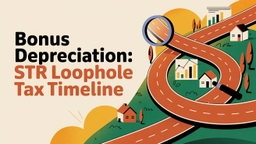Introduction
When the One Big Beautiful Bill was signed into law in 2025, it brought back something short-term rental investors had been eagerly waiting for: the return of 100% bonus depreciation. For the first time since 2022, owners of vacation rentals can once again use a cost segregation study to write off a large portion of their property’s value in the very first year it’s placed into service.
This change has generated a wave of excitement among Airbnb and short-term rental hosts who see the opportunity for massive upfront tax savings. But here’s the catch: not everyone qualifies. While the bill reopened the door to one of the most powerful tax strategies in real estate investing, there are still strict rules around ownership, participation, and timing.
That’s why it’s just as important to know who doesn’t qualify as it is to understand who does. In this article, we’ll break down the key scenarios that can disqualify you from claiming bonus depreciation on your STR in 2025 — and explain the deadlines you’ll need to hit if you’re planning to buy your next property this year.
Not sure if you qualify? Connect with a Chalet Bonus Depreciation Specialist for a free consultation and get clarity before tax season.
Who Does Not Qualify for 100% Bonus Depreciation
1. Average Guest Stay Longer Than 7 Days
If the average stay at your property is more than 7 days, the IRS may not treat it as a short-term rental business. Instead, it could be categorized as a traditional rental activity, which disqualifies you from using bonus depreciation to offset active income unless you provide substantial services to guests.
2. You Don’t Own the Property
Only legal property owners qualify. If you lease a property or own shares in a co-op instead of holding direct title, you cannot use cost segregation or bonus depreciation.
3. Excessive Personal Use
If you personally use the property for more than 14 days per year or more than 10% of the total days it’s rented, the IRS considers it a personal-use property. That disqualifies it from bonus depreciation.







